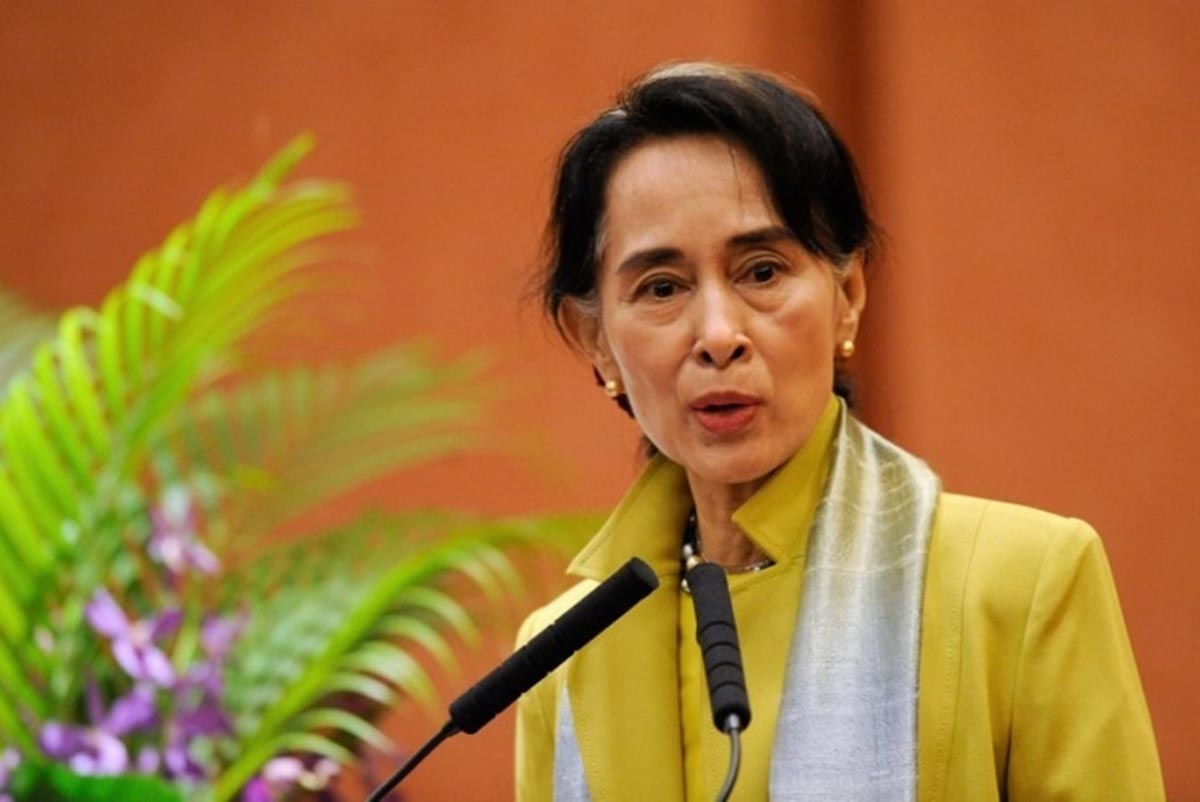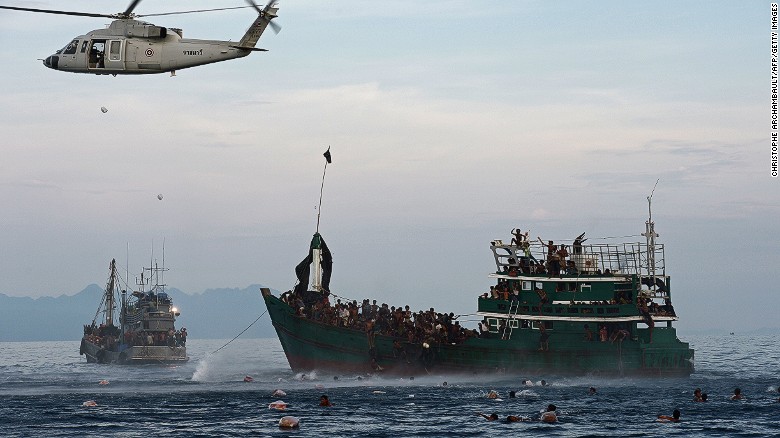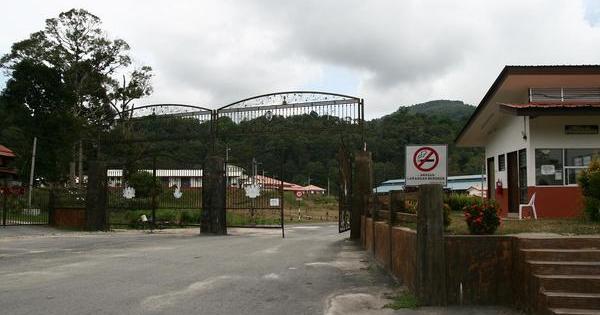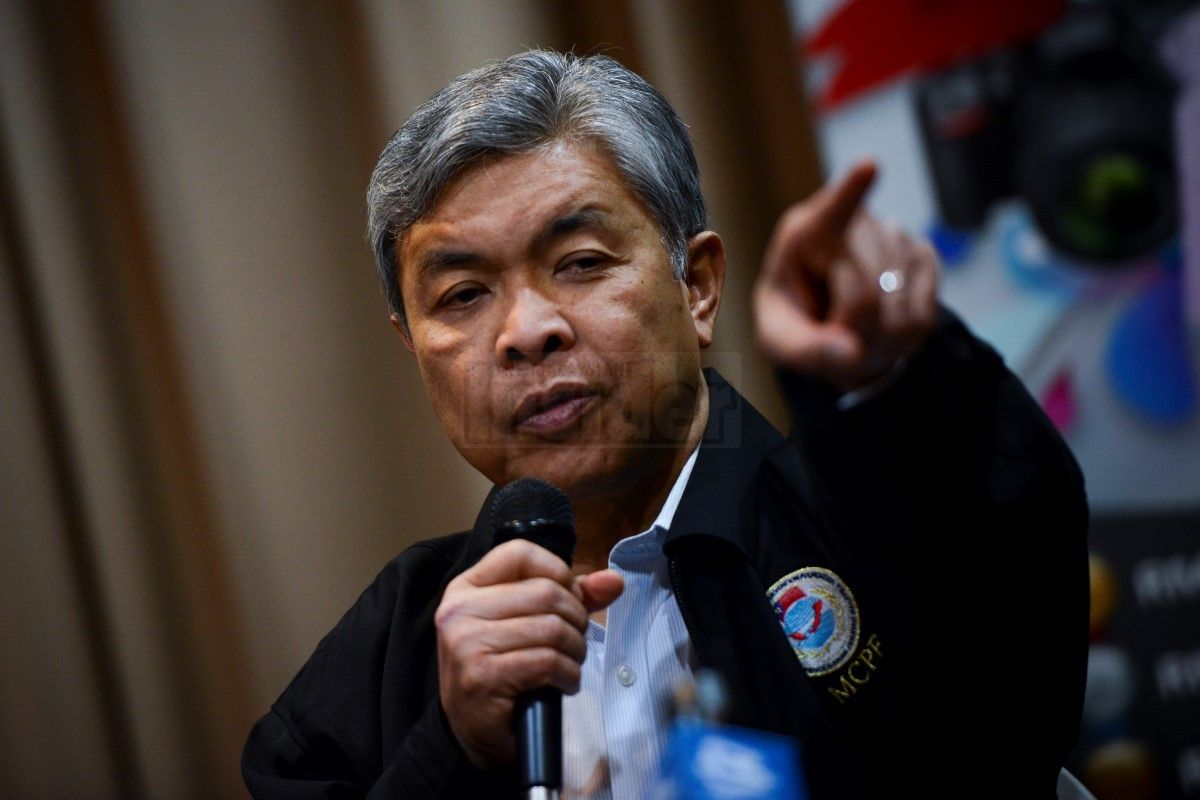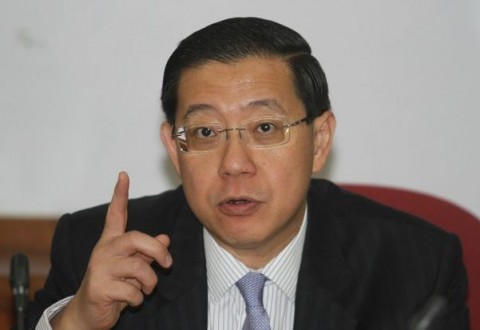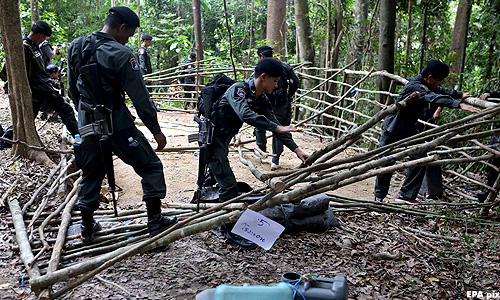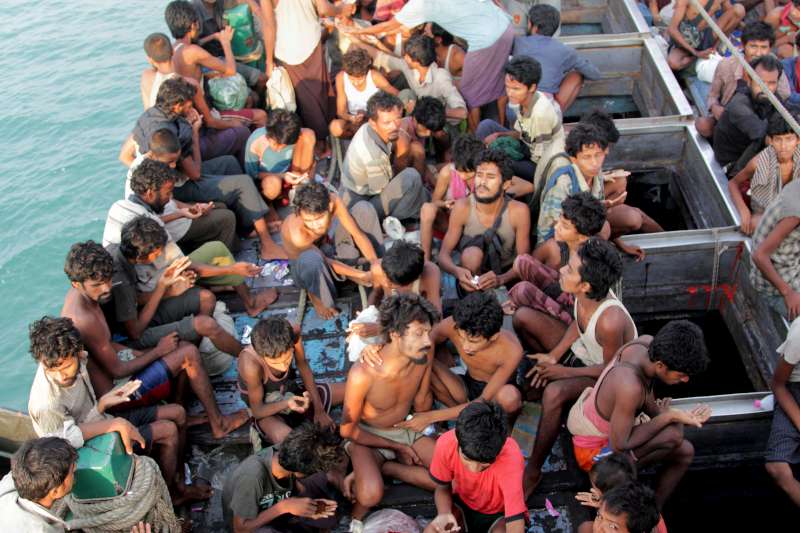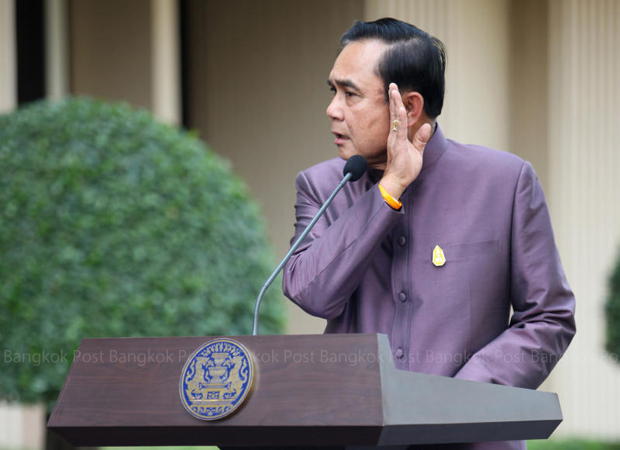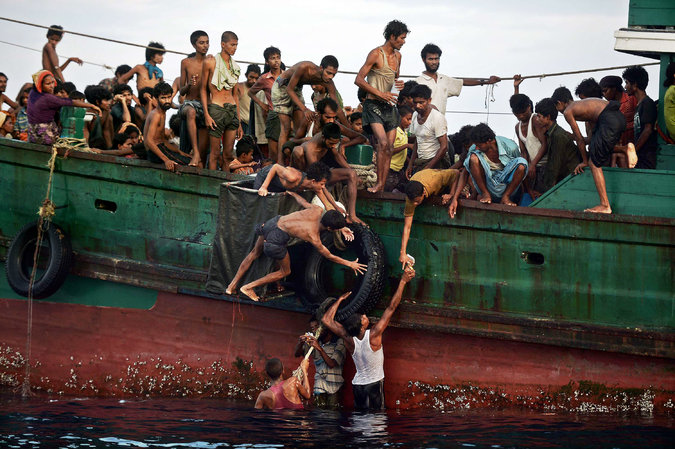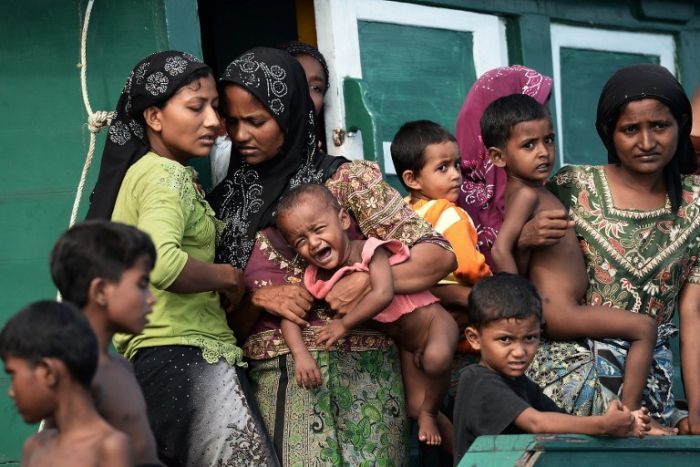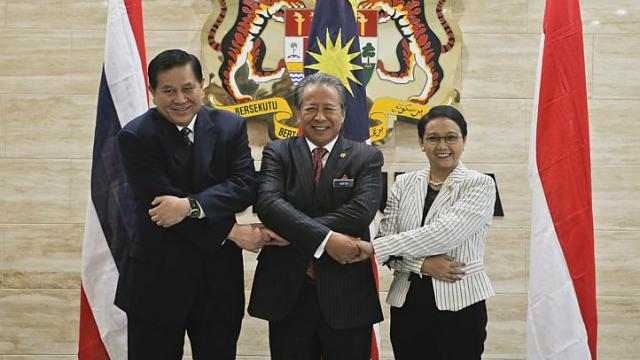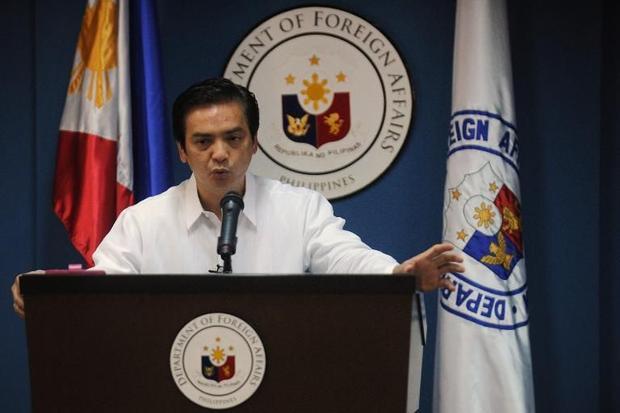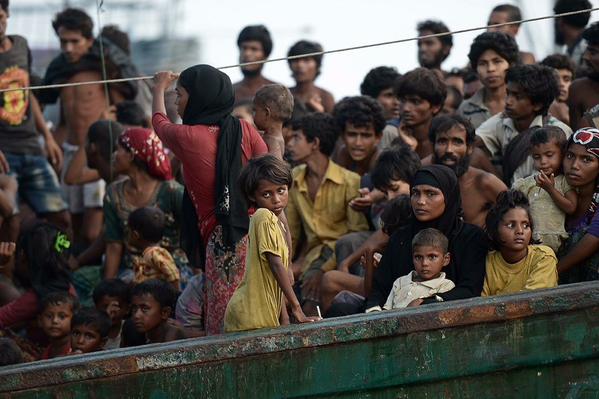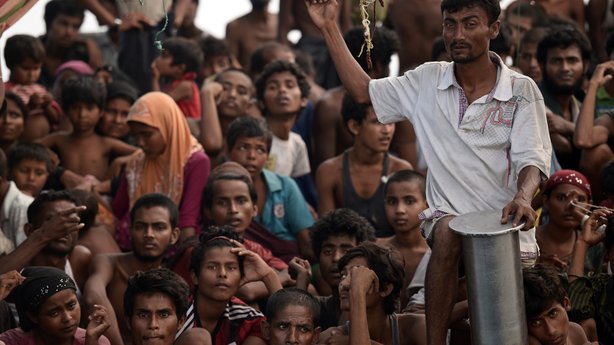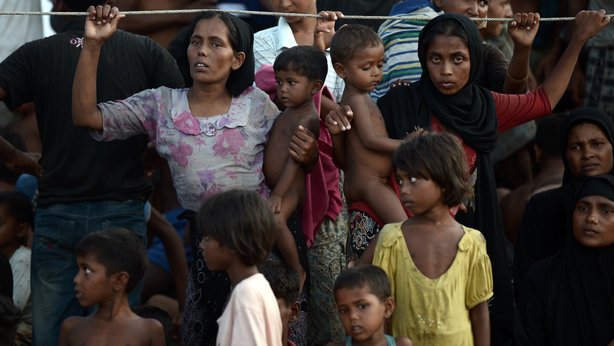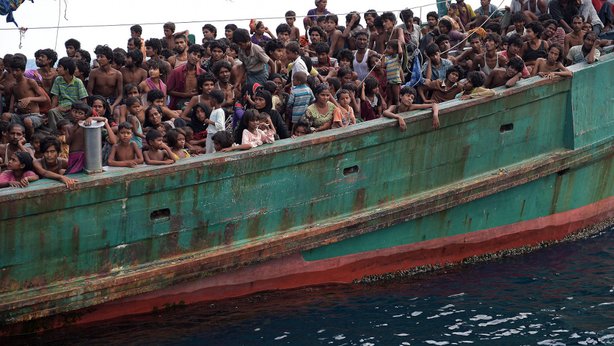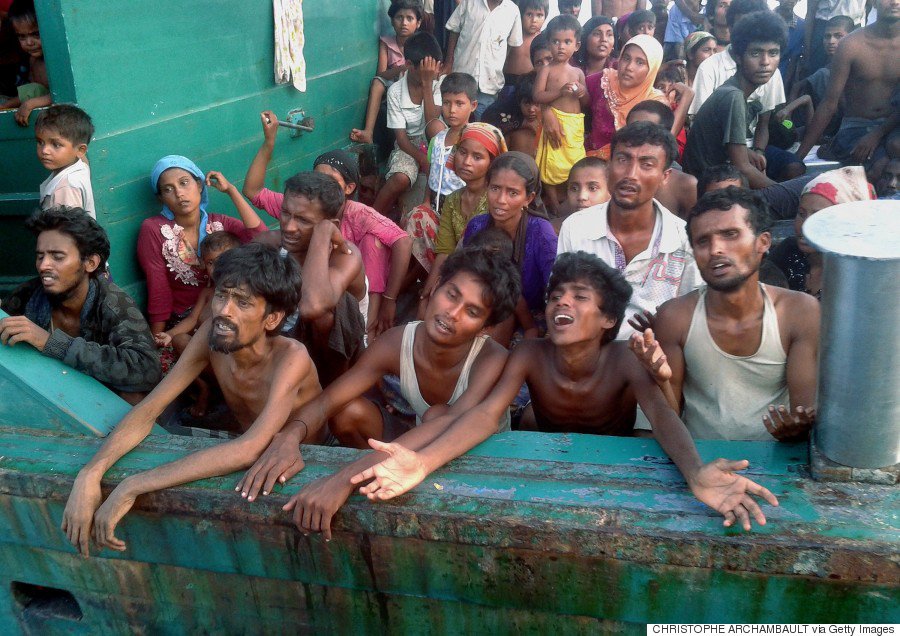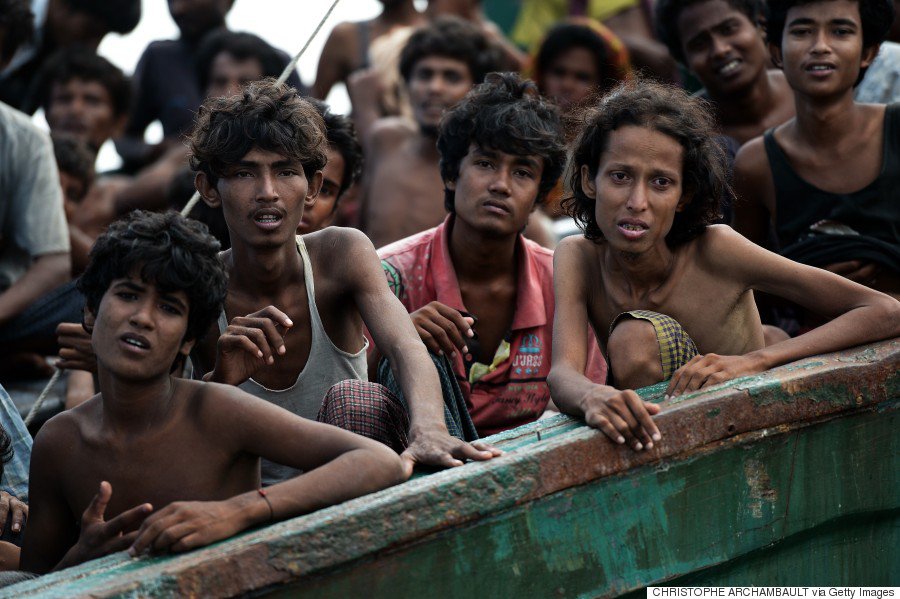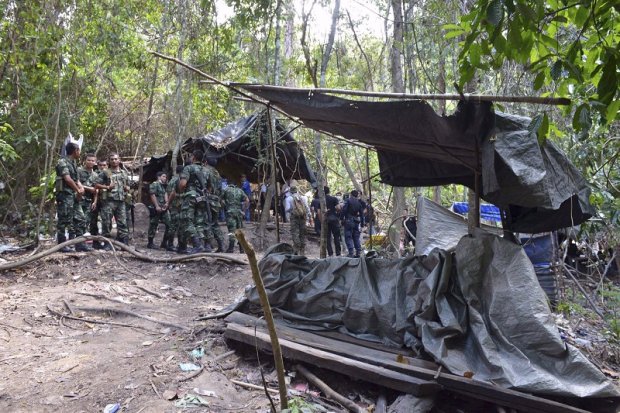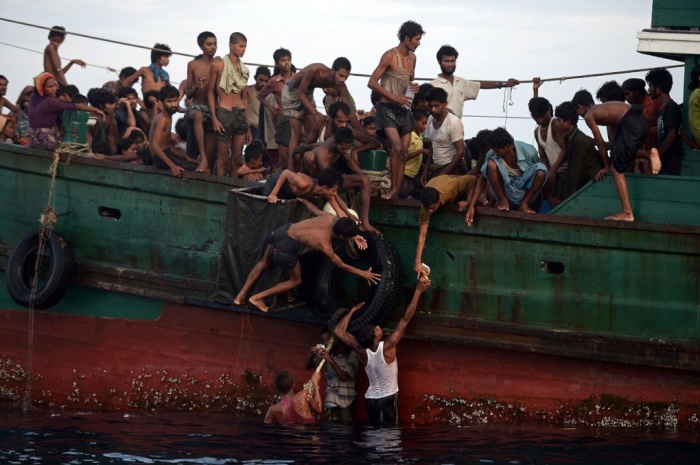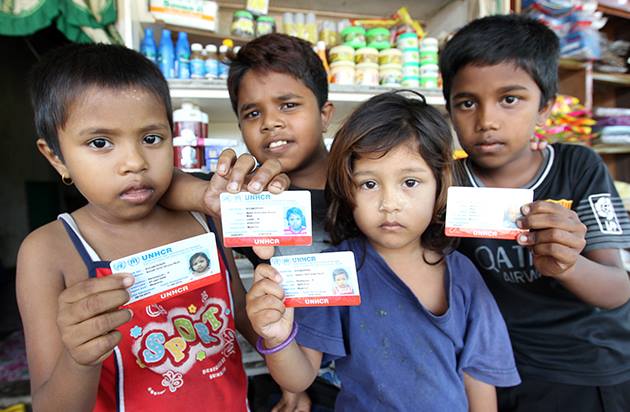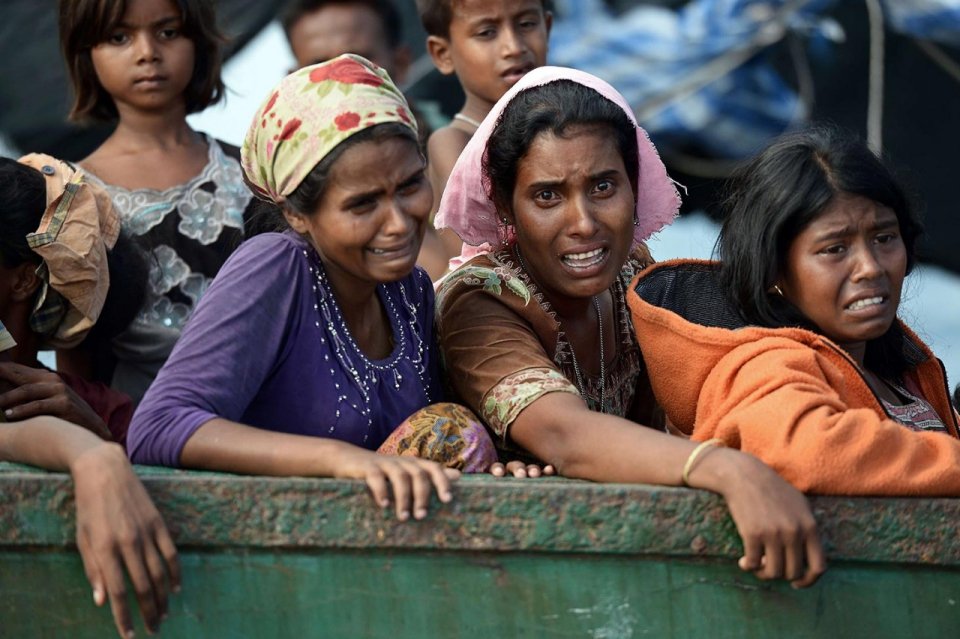Who Will Save The Rohingyas? What Are SEA Leaders Doing To Handle The Crisis?
Thousands of Rohingya refugees continue to drift aimlessly off the coast of Malaysia, Thailand, and Indonesia, yet leaders from Myanmar, Bangladesh and the aforementioned countries are still playing "a game of marine ping pong" without a foreseeable solution to the crisis.
Aung San Suu Kyi not invited to global meeting due to continued silence on plight of Rohingya migrants
The international gathering at the Nobel Institute in Oslo, Norway, was opened Tuesday by former Norwegian prime minister Kjell Magne Bondevik. His country pledged $1.3 million to help Rohingya in Myanmar's Rakhine state by improving living conditions, preventing people from fleeing by sea and curbing tensions between ethnic groups.
The website for the three-day Oslo conference says the popular daughter of Myanmar's late independence hero, Aung San, shares the "anti-Rohingya" sentiment of much of the population, something she had denied, but with little vigor. Aase Sand, of the Norwegian Burma Committee, one of the event's organizers, said there was never a plan to invite her or to ask for a videotaped statement.
Nobel Peace Prize laureates Desmond Tutu, José Ramos-Horta and Mairead Maguire as well as philantrophist George Soros recorded video statements for the meeting, focusing on ways to end the decades-long persecution of Rohingyas and the need to speak out
Soros, who'd escaped Nazi-occupied Hungary, said that "the most immediate threat to Burma's transition is the rising anti-Muslim sentiment."
"As a Jew in Budapest, I too was a Rohingya," he said in a video statement. "The parallels to the Nazi genocide are alarming. Fortunately, we have not reached a stage of mass killing."
Tutu, who won the 1984 Nobel Peace Prize for his opposition to South Africa's brutal apartheid regime, said in his video statement, "If you are neutral in situations of injustice, you have chosen the side of the oppressor. If an elephant has its foot on the tail of a mouse and you say that you are neutral, the mouse will not appreciate your neutrality."
Aung San Suu Kyi, who won a Nobel Peace Prize in 1991 for her "non-violent struggle for democracy and human rights", has remained largely reticent on one of Southeast Asia's worst humanitarian crises.
When asked about the issue, she remarked that it is the Myanmar government's responsibility to solve it.
When asked last week by local media about the migrant issue, Ms Suu Kyi responded: “They are the issues to be solved by the government. It is better to ask the government about it.”
Critics and observers are of the opinion that Suu Kyi may have opted to keep mum over the migrant crisis to protect her opposition party, the National League of Democracy's (NLD) electoral interests
The 69-year-old says she is a politician and that she never sought to be a human rights champion. Critics note she is carefully choosing her battles, in part because she has presidential ambitions.
“Aung San Suu Kyi and her strategists are looking at the electoral maths,” says Nicholas Farrelly, director of the Australian National University’s Myanmar Research Centre.
“They have long imagined that any perception the NLD is too cosy with the country’s Muslims could lose them millions of votes. That, at least, is the fear. They are anxious that the Rohingya could serve as a wedge between Aung San Suu Kyi and tens of millions of Buddhists that she is counting on for votes. It doesn’t help that many NLD members probably support harsh treatment for the Rohingya and feel no special compassion for them.”
Meanwhile, the United States military has begun surveillance flights in the search for Rohingya and Bangladeshi boat people who are stranded in the Southeast Asian seas
State Department spokesman Jeff Rathke said Tuesday that U.S. Navy P8 aircraft flew over the weekend with Malaysian support.
Rathke said the U.S. has offered to help governments in the region by providing information about boats possibly carrying migrants in the Andaman Sea and the Bay of Bengal.
25 May: Penang suggests using vacant NS camps as temporary shelters for Rohingya boat-people
“In Penang, there are two vacant national service camps in Balik Pulau and one each in Sungai Bakap and Machang Bubuk. These facilities are suitably designed and securely fenced,” said Penang Welfare and Caring Society Committee chairman Phee Boon Poh, who said this was Penang’s idea.
“We can only give ideas, and we are waiting for federal authorities to call us so we can discuss what role Penang can play. No one has called us yet,” he added.
Home Minister Datuk Seri Dr Ahmad Zahid Hamidi had previously challenged the state's "sincerity" in championing human rights after Penang CM Lim Guan Eng was reported to have said that Penang's lands are not sufficient to house refugees
“We want to see the sincerity of the Penang government, led by DAP and partnered by PAS and PKR, who have become champions of human rights and been encouraging the Federal Government to adopt humanitarian policies,” said Ahmad Zahid.
“Accept the migrants into Penang,” he dared.
According to Lim, some 50,000 Rohingya migrants arrived in Penang over the last six years and that state land could not be used to house them. He also said the migrants should be housed on land owned by the Federal Government, stressing that the state was crowded and that it had not been consulted by the National Security Council.
Lim then rebutted by telling Ahmad Zahid to not politicise what is supposed to be a "humanitarian issue". He also said Penang is ready cooperate, but they have not been given any information from the Federal Government
"The Penang government has said we are willing to cooperate with the federal government on national security on the Rohingya issue but we have not been informed about the specifics. They have not briefed us at all," said the Penang Chief Minister.
thestar.com.myHe said although Ahmad Zahid had called on Penang to assist in the issue of Rohingya refugees, the manpower and authority lies under the purview of the Federal government.
“Manpower and authority are from the Federal government. Immigration and the army are also from the Federal government. Does he want to give all these to the state government? Even he knows he won’t,” Lim said.
In a darker twist of events, the Home Minister has confirmed the discovery of mass graves with more than 100 dead immigrant near the Malaysia-Thai border in Perlis. Police also found 17 tents, which are suspected to have housed trafficking victims.
Police are still exhuming the bodies found in the mass graves discovered in Padang Besar, Datuk Seri Dr Ahmad Zahid Hamidi said today.
The home minister said it has not been determined if bodies are those of people-smuggling victims as has been claimed, and the authorities here were working closely with their Thai counterparts on the matter.
He also said that checks by the Immigration Department on the migrants who landed in Langkawi earlier this month, suggest that the human trafficking racket was being run by Thais and recruitment agents from source countries such as Myanmar and Bangladesh.
But the discovery of the graves and camps on the Malaysian side of the border left little doubt that locals were involved too, he said.
Meanwhile, Indonesian armed forces and the Turkish navy has joined the Malaysian navy in the search and rescue missions for Rohingya and Bangladeshi migrants stranded at sea. Turkey has also pledged to add $1 million to aid humanitarian efforts for the stranded migrants.
Indonesian armed forces spokesman Fuad Basya said Sunday that the country’s navy began its search Saturday and continued through the weekend, marking the first time that Indonesia has said it would rescue the migrants. Malaysia began searching last week. So far, none have been found.
 wsj.com
wsj.com
On May 19, Prime Minister Ahmet Davutoğlu said that Turkey was doing its best to reach Rohingya Muslims at sea with the International Organization for Migration (IOM), with the help of a ship from the Turkish Armed Forces already sailing in the region.
22 May: Thai PM tells critics to "migrate out to the sea" and swap places with Rohingya migrants
The comments from Prime Minister Prayut Chan-O-Cha came as Bangkok was criticised for not following Indonesia and Malaysia in agreeing on Wednesday to accept stranded migrants.
“Anyone who supports this idea (of accepting boatpeople), please contribute one baht a day or take them to your home when their case has been processed,” the former army chief, who took over in a coup a year ago, told lawmakers during a speech on the budget.
“Or you migrate out to the sea and bring them to live here instead,” he added.
On 21 May, Indonesia and Malaysia had agreed to set up temporary shelters to house Rohingya migrants while Thailand declined to do so during a meeting between all three nations.
The ASEAN Parliamentarians for Human Rights described the decision as a "colossal failure of regional leadership", but Prayut defended Thailand's stance towards migrants, saying that the country is already home to more than 900,000 refugees.
In his remarks on Thursday to the National Legislative Assembly he said Thai soldiers get a smaller food allowance than detained migrants. “Thai soldiers get a food allowance of 20 baht (59 cents) a day, but these people (detained migrants) get more than 70 baht,” he said, adding there were “a lot of problems” caused by their needs such as having to slaughter their own meat — a reference to halal food.
He also added that existing detention centres would be used to hold those found to have entered Thailand illegally.
Thailand has said it will stop towing boats back to sea, something Malaysia and Indonesia had been doing in recent days. It has also said it will allow the sick to come to shore for attention, but has stopped short of saying whether it will allow other migrants to disembark.
21 May: PM Najib orders search and rescue operations to prevent loss of Rohingya lives
Malaysian PM Najib Razak announced on Facebook yesterday that the Royal Malaysian Navy (TLDM) and Malaysian Maritime Enforcement Agency (APMM) have been given orders to search for and rescue Rohingya migrants who are stranded at sea
TLDM and APMM have also been instructed to assist MERCY Malaysia's humanitarian efforts for Rohingya migrants, whether by sea or land
I have instructed @tldm_rasmi & APMM to assist @MERCYMalaysia to deliver humanitarian assistance to the Rohingyan refugees, by sea or land
— Mohd Najib Tun Razak (@NajibRazak) May 20, 2015
It is basic human compassion tt we ensure the hungry wl b given food & water while the sick wl b attended to w medical treatment & supplies.
— Mohd Najib Tun Razak (@NajibRazak) May 20, 2015
20 May: Glimmer of hope for 7,000 Rohingyas as Malaysia and Indonesia will provide temporary shelter
The announcement was made on 20 May by the Malaysian foreign minister, Anifah Aman, after a meeting with Indonesia and Thailand. Anifah said the two countries agreed to give the estimated 7,000 stranded migrants temporary shelter “provided that the resettlement and repatriation process will be done in one year by the international community”. He added for Malaysia that the temporary shelter will not receive any new migrants seeking refuge.
Anifah said the two countries have yet to decide on where to place the temporary shelters, but assured that both governments are committed to seeing the programme through. “This is not just an Asean problem. This also a problem of the international community,” the foreign minister said, using the acronym for the Association of South East Asian Nations.
Thai junta leader Prayuth Chan-Ocha has questioned whether it was fair to ask a “middle country” like Thailand to take responsibility for the Rohingya. The Thai government will hold a one-day meeting on undocumented migrants May 29 in Bangkok. It will be attended by senior officials from 15 affected countries, including Australia, Indonesia and Vietnam, its foreign ministry said.
Ministers of Foreign Affairs from Thailand, Mr Tanasak Patimapragorn (left), Malaysia, Datuk Seri Anifah Aman (centre), and Indonesia, Ms Retno Marsudi (right) holding hands during a meeting on human trafficking and people smuggling in Putrajaya, Malaysia on May 2015.
Image via EPA/Straits TimesOn 18 May, the Philippines announced that they will accept 3,000 Rohingya refugees stranded at sea, as Manila is a signatory to the U.N. refugee convention and the 1954 Convention Relating to the Status of Stateless Persons
Philippines department of Foreign Affairs spokesperson Charles Jose says his country is willing to help the Rohingya and Bangladeshi migrants.
Image via Jay Directo/Digital Journal“We have the commitment and the obligation to extend humanitarian assistance to these asylum seekers,” foreign affairs department spokesman Charles Jose told ANC television. However, he added, “We can’t go into much detail yet. We are not yet into that point. What we are saying now is our broad policy statement regarding this issue.”
Describing a precedent to the current situation, Jose pointed to the example of the Philippines accepting Vietnamese refugees at the end of the Vietnam War in the 1970s.
In that case, the Philippines accepted boat people who arrived directly on its shores but also others who had originally landed in other countries. About 400,000 Vietnamese refugees went through Philippine camps and were eventually relocated to other countries, according to a government website.
President Benigno Aquino’s spokesman also said the Philippines was open to helping the refugees, as he cited the values of mercy and compassion found in the nation’s dominant Catholic religion. “As the only predominantly Catholic nation in Southeast Asia, it is our duty to provide succour to those in need,” presidential spokesman Herminio Coloma told AFP.
Meanwhile, Myanmar stated that the country "shares concerns" expressed by the international community and is "ready to provide humanitarian assistance to anyone who suffered in the sea." However, the government denies any conflict in Rakhine and claims this is a human trafficking issue.
Myanmar state media quoted a Foreign Ministry statement which is its most placating comments yet on 20 May saying the government "shares concerns" expressed by the international community and is "ready to provide humanitarian assistance to anyone who suffered in the sea."
thestar.com.myThe quasi-military government has denied any conflict in Rakhine and said the issue was one of human trafficking. Myanmar says it’s making “serious efforts” to prevent the migration from Rakhine state.
“Preventive measures on human smuggling and illegal migration are being implemented throughout the nation,” the Ministry of Foreign Affairs said in a statement published in the state-owned Global New Light of Myanmar.
“Likewise, the Rakhine state government and concerned departments are endeavoring diligently to prevent illegal migration by sea. Measures are also in place to maintain rule of law and security for all individuals there.”
 dailystar.com.lb
dailystar.com.lb
19 May: Myanmar states Thailand and M’sia are partly responsible for Rohingya migrant crisis by taking in “cheap workers”
“The neighbouring countries and regional countries are looking for cheap workers who can be treated like slaves without consideration for their human rights and who can be killed quietly without anybody noticing,” said Zaw Htay, a senior official from the president’s office, in a Facebook post.
“Thailand and Malaysian governments have already admitted that their government officials have complicit in allowing the illegal immigrants to work in their countries.”
While Myanmar opposition leader Aung San Suu Kyi remained silent on the issue, a spokesman for the political party National League for Democracy (NLD) made a bold statement in favour of granting the stateless Rohingyas their basic human rights
"If they are not accepted (as citizens), they cannot just be sent onto rivers. Can't be pushed out to sea. They are humans. I just see them as humans who are entitled to human rights," Nyan Win told reporters on the sidelines of a meeting between political parties and President Thein Sein in Yangon.
Meanwhile, a boat carrying around 300 men, women and children that has been bouncing between the waters off Thailand, Malaysia, and Indonesia has not been heard from in more than 60 hours. The Thai navy had sent it on its way after repairing the engine and giving them food, medicine, and water.
The Thai navy said it had repaired the engine and provided visibly thin passengers with food, water and medicine on both Thursday and Saturday before "escorting" the vessel into international waters.
But its location is now unknown.
Thai authorities insist the passengers wanted to travel southwards onto Malaysia and say they have had no news of the vessel since around 9pm Saturday.
Chris Lewa of The Arakan Project, a Rohingya rights group that monitors boat crossings, said her team was last in contact with the ship by telephone on Saturday evening. Since then the phones have gone unanswered.
"It's very worrying," she said. "They had told us that the men were taking all the food and that the women could not get the food. They were only getting little bits left over. That was the last we heard from them."
In Thailand, authorities have reportedly arrested Patchuban Angchotipan, a former government official suspected of heading a major human trafficking network
The Royal Thai Police said they suspected Patchuban Angchotipan, a former official in the provincial government of the southern Satun province, was the boss of a large human trafficking network.
“In Satun province he is high-level,” said Thai national police chief General Somyot Poompanmuang. “He is the chief. He has many subordinates.”
Patchuban, whose nickname is ‘Kor Tong’, has been charged with a range of offences including human trafficking, smuggling illegal migrant workers into Thailand, detention of others leading to bodily harm and holding people for ransom. He denies the charges against him.
18 May: The plight of stateless Rohingyas have been on the forefront of local and international news in the past few weeks, as thousands of refugees fleeing Myanmar and Bangladesh are left adrift in the Andaman sea and Malaccan Straits after being rejected entry into Malaysia, Indonesia and Thailand
Activists say 8,000 people may be adrift on overcrowded vessels, with starvation and disease claiming lives, after a Thai crackdown crimped busy routes and spurred people-smugglers to abandon men, women and children at sea.
A minority group in a predominantly Buddhist nation, the Rohingya Muslims have been discriminated against for decades in Myanmar and even Bangladesh, where some have fled to after facing persecution and violence from Buddhist extremists in recent years
The Rohingyas are believed to have been illegally smuggled South East Asia for years by human traffickers under the promise of a better life in Malaysia and its neighbouring countries.
However, the recent discovery of shallow graves in an abandoned human trafficking camp in southern Thailand has led to a disruption of the smugglers' usual land route as well as the arrest of several officials alleged to have been involved in the trade.
Many traffickers and their associates, encompassing agents and brokers on land, corrupt police officers and even politicians, have since gone into hiding, leaving migrants stuck on boats for weeks and months with limited provisions and with nowhere to land
Recent security crackdowns forced the smugglers to change tactics, instead holding people on large ships parked offshore.
Initially they were shuttled to shore in groups on smaller boats after their "ransoms" were paid. But as agents and brokers on land got spooked by arrests - not just of traffickers but also police and politicians - they went into hiding. That created a bottleneck, with migrants stuck on boats for days and weeks.
Malaysia, Thailand, and Indonesia have turned migrant boats away in recent weeks in fear of a potential unstoppable flow of refugees.
This has led to the Human Rights Watch and the International Organization for Migration criticising all three countries for playing "a game of marine ping pong" with the unwelcomed refugees.
International newswire AFP reported that Malaysia turned away Thursday two vessels carrying about 600 migrants off Penang and Langkawi.
A recent Thai crackdown on human trafficking has caused people smugglers to abandon ship, leaving thousands of Bangladeshi and Rohingya migrants stranded in the Andaman Sea.
Some 800 migrants, however, reportedly managed to land in Acheh in Indonesia on Friday, while 1,158 migrants had reached Langkawi last week and are being sent to the Belantik detention centre in Kedah before Putrajaya deports them back to their home countries.
Phil Robertson, deputy director of Human Rights Watch's Asia division told the BBC: "They're [Malaysia, Thailand and Indonesia] playing a game of marine ping-pong not wanting to take in the Rohingyas.
He said it was necessary for the three countries to work together in rescuing them before they decide who is going to take responsibility for them.
"This is an urgent humanitarian crisis and the Thais and others seem to be taking a gentle stroll."
“What we have now is a game of maritime Ping-Pong,” said Joe Lowry, a spokesman for the International Organization for Migration in Bangkok.
“It’s maritime Ping-Pong with human life. What’s the endgame? I don’t want to be too overdramatic, but if these people aren’t treated and brought to shore soon, we are going to have a boat full of corpses.”
According to the United Nations (UN) refugee agency, Malaysia is currently home to 45,000 Rohingya refugees and is unable to accept more from the boatloads of migrants heading towards the country
After Malaysian officials turned back a boat with about 500 people off Penang Island on Wednesday, Deputy Home Minister Wan Junaidi said, “What do you expect us to do?”
“We have been very nice to the people who broke into our border,” he told The Associated Press. “We have treated them humanely, but they cannot be flooding our shores like this. We have to send the right message that they are not welcome here.”
UN Secretary-General Ban Ki-moon and his deputy Jan Eliasson have discussed the issue with ministers from Malaysia, Thailand, Indonesia, and Bangladesh where leaders were urged to not turn away the refugees
U.N. Secretary-General Ban Ki-moon has spoken to the prime ministers of Malaysia and Thailand in recent days about the plight of the stranded refugees, while Deputy Secretary-General Jan Eliasson has contacted senior officials in Bangladesh and Indonesia, according to a statement issued Sunday by the spokesman for the Secretary-General.
"In their discussion with leaders in the region, they reiterated the need to protect lives and uphold international law," Ban's spokesman said in a statement.
They urged the leaders to "uphold the obligation of rescue at sea" and not turn away the refugees.
Malaysian Prime Minister Najib Razak has said that he will be seeking help from Myanmar to address the matter before it turns into a "human tragedy"
Prime Minister Najib Razak said "we are liaising with the Myanmar government to get their response," according to Malaysia's official Bernama news agency.
"I hope they will give a positive response as the refugees were due to internal problems that we cannot interfere with, but we want to do something before it gets worse," he said.
"We respect the Asean principles whereby we do not interfere with the internal affairs of other Asean countries. However when a certain problem has spread and affects the leadership of other Asean nations and possibly outside Asean, then we need to find solutions through an Asean forum and cooperate with other parties," he told reporters after officially handing over the Melana Indah Fasa 1 People's Housing Project (PPR) on Saturday.
Najib said Malaysia should not be burdened by the issue of ethnic Rohingya refugees, particularly when the source of the problem does not come from within the country.
"We are very sympathetic towards those who were floating in the open seas. Many were killed, including children and so forth,' he said. "Because of that we allow some of them to land and provide humanitarian aid to them but Malaysia must not be burdened with this problem as there are thousands more waiting to flee from their region."
Malaysian Foreign Minister Datuk Seri Anifah Aman, Malaysia has met with the foreign minister of Bangladeshi as a lead-in to higher-level talks with other countries - including Myanmar - to find a solution to the ever-growing migrant crisis
Malaysian Foreign Minister Datuk Seri Anifah Aman met with Abdul Hassan Mahmood Ali, the foreign minister of Bangladesh, in the state of Sabah on Sunday, a prelude to wider talks involving the Thai and Indonesian foreign ministers set for Monday and Wednesday.
"We have to look at our own interests too, our social problems and security problems — we have to take that into consideration," Anifah said.
"We are asking Myanmar to participate in finding a solution," he added.
However, Myanmar does not seem keen on cooperating to solve the crisis as the country are not happy about allegations that they are the source of the problem
Burma has indicated it will not take back the migrants unless it can identify them. Despite more than one million Rohingya living in Burma’s Rakhine state, they are not recognised, denied citizenship and are treated as illegal immigrants from Bangladesh.
Of the proposed 29 May summit, Burma’s presidential office director Zaw Htay told AFP: “We are unlikely to attend …We do not accept it if they [Thailand] are inviting us just to ease the pressure they are facing.”
"We are not ignoring the migrant problem, but our leaders will decide whether to attend the meeting based on what is going to be discussed," Maj. Zaw Htay, director of the office of Myanmar's president, said Saturday. "We will not accept the allegations by some that Myanmar is the source of the problem."
He directed some of the blame on Myanmar's neighbors, saying that from a humanitarian point of view, "it's sad that these people are being pushed out to sea by some countries."
Meanwhile, Nobel Peace Prize winner and opposition leader Aung San Suu Kyi has yet to provide her input on the mounting crisis, leading to a flurry of criticism on what is seen as a reluctance to comment on Myanmar's "ethnic cleansing" of Rohingya migrants
When Aung San Suu Kyi led demonstrations Rohingya were among protesters and her supporters. Now she's pretending they don't exist.
— Erna Mahyuni (@ernamh) May 15, 2015
Where's A. S. Suu Kyi? What has she done to stop the mass killings of the Rohingyas? Did she only fight for her own release from oppression?
— Rizal Zulkapli AWANI (@rizalzulkapli) May 16, 2015
Suu Kyi has created controversy following an interview with The Guardian in July 2012. The 69-year-old politician said that she did not know if Rohingya ethnic can be recognised as Myanmar nationals.
In November, 2012, Suu Kyi in an interview with an Indian bulletin citing him as wanting to take the middle path in their effort for truce.

